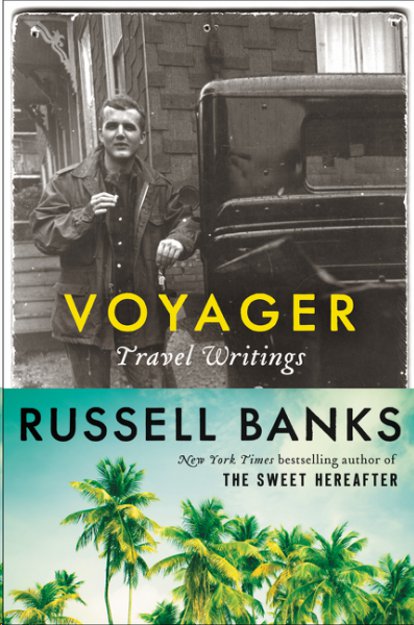In ‘Voyager,’ Russell Banks Is Restless in Love and Travel

Voyager: Travel Writings
By Russell Banks
Ecco
272 pages
Russell Banks is, as his publisher notes, “one of America’s most prestigious fiction writers.” But, as depicted in his recent book of travel essays, Voyager, he can be a cranky traveler, as well. In “The Wrong Stuff,” his account of climbing the Andes in Ecuador, he gets impatient when the group leader Alex lectures the amateur mountaineers on the value of proper walking, breathing, and resting techniques:
“Consequently, I let my attention wander from the lecture and instead contemplated the surreal beauty of the Andean landforms, so that when, at the next stop, he quizzed us on these techniques, I ended up the bad student again. Perhaps the lectures were useful to others, and we might need to remember them later, when out on the glacier-covered breast of Cotopaxi, but, for me, when I think too much about walking and breathing and resting, I tend to do them badly, so I tuned out …”
Banks is also an observant and thoughtful voyager, as is clear in pieces about journeys to Senegal, Himalaya, the Antilles and elsewhere. Throughout these essays, he ruminates on issues related to aging and manhood, juxtaposed with piercing descriptions of the widely divergent terrains in which he finds himself.
In the long title piece, Banks combines a discursive look at his multiple marriages (“A man who’s been married four times has a lot of explaining to do”) with accounts of island-hopping in the Caribbean, a favorite locale.

He comes across as alternately guilt-ridden over his treatment of his wives and at times belligerent about demands made on him by women and friends. In recounting the rigors and delights of a magazine-commissioned travel piece (“Thirty islands in sixty days”), he sometimes skims over key details and offers up a glossy summary of his experiences. It seems the article he finally wrote helped to exorcize personal demons, as much as convey the overall experience to readers.
Other pieces are more insightful and descriptive. For example, “Primal Dreams” details his travels through the Everglades, an occasion to reflect on the broader experience of travel itself:
“In our time, much of travel that is freely elected by the traveler is time travel. We go to Paris, tour Venice, visit Athens and the Holy Land, mainly to glimpse the past and walk about the cobbled streets with a guidebook, a sun hat, and a furled umbrella—emulating as best we can Henry James in Rome, Flaubert in Cairo. Or we fly to Tokyo, Beijing, Abu Dhabi, perhaps, for a safe, cautious peek into the future. Sometimes, for both the past and the future at once, we make our way to cities like Lagos, Mexico City, Lima. It’s time travel, but it’s strictly to the past and future of humanity that we’ve gone.”
An elegiac essay, “Pilgrim’s Regress,” describes a college reunion at the University of North Carolina at Chapel Hill, to which Banks travels in a van with at least six other people. Over the course of a few days, he passes through the expected panoply of emotions, heightened by a black-and-white photograph someone hands him of his ex-wife Christine.
She’s the one he wanted to see, he realizes, “to hang out at a party at Bob Brown’s farm in the dusky rose light watching the fawn-colored horses move nervously back and forth against the split-rail fence, while behind us the peacocks screamed from their perches on the dogwood trees.”
At moments like these, one of America’s most prestigious writers earns his marks with beautiful and evocative prose.
Author Bio:
Lee Polevoi, Highbrow Magazine’s chief book critic, is completing a novel, The Confessions of Gabriel Ash.
For Highbrow Magazine





























































































































































































































































































































